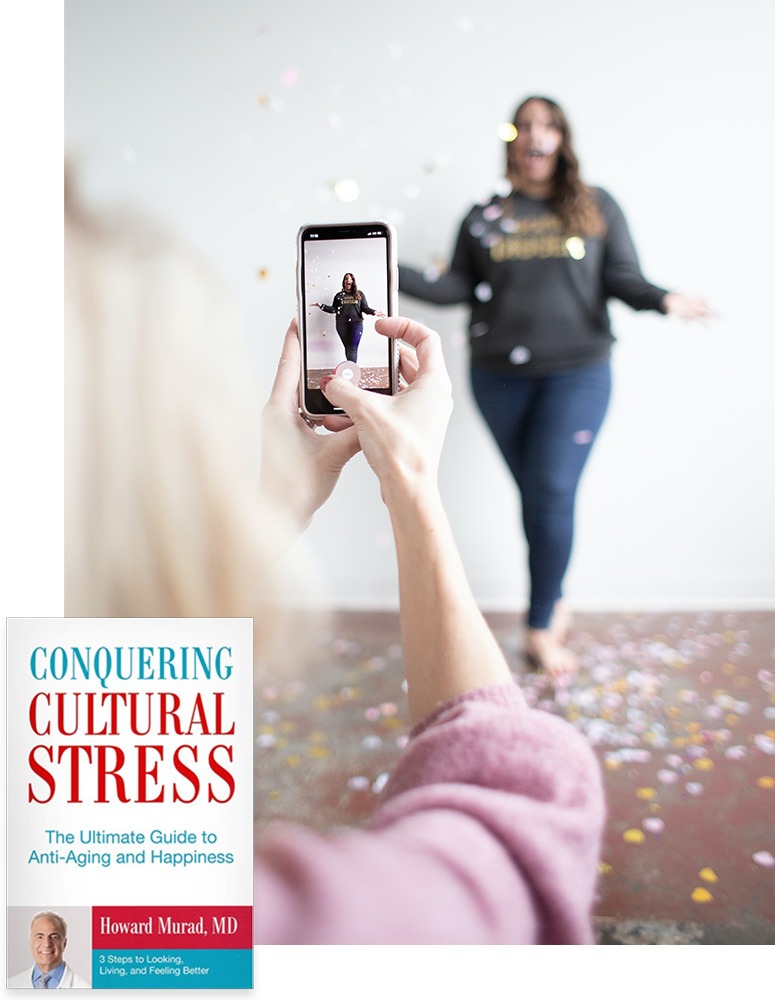Does this cell phone make me look fat?
It’s no secret that Americans are getting fatter. According to the Centers for Disease Control (CDC), nearly three-quarters of adult Americans nationwide were overweight in 2015-16, while nearly 38% of them were obese! And, while overweight and obesity used to be considered a “First World” problem, in April 2020, the World Health Organization that reported overweight and obesity are also rising in low- and middle-income countries, particularly in urban areas.
There are many factors likely to share responsibility for this: our industrialized food system that emphasizes refined sugars and unhealthy fats over fresh whole foods; changes to our physical activity patterns and modes of transportation; changes to the technology we employ on a daily basis. But one factor that exacerbates all of the others is Cultural Stress: the constant, pervasive, ever-accelerating stress of modern living.
Cultural Stress is the result of 24-hour media connectivity, blurring the boundaries between work and home, public and private. We’re now digitally connected to each other and to information, goods, and services at any hour of the day or night. While this technology has conferred many benefits, it also has created new forms of stress. For example, constant comparisons to the lives of others as portrayed on social media have led to an increase in FOMO (fear of missing out), low self-esteem, depression, and even suicide, particularly among adolescents and young adults.
Constant connectivity has made it more difficult to leave work at the office, infringing on time that is meant to be spent relaxing, rejuvenating, and enjoying relationships with family and friends. As a result, more people of all ages report feeling higher levels of stress than did previous generations.
A team of researchers led by Eline S. van der Valk and reported in Current Obesity Reports (June 2019) wrote,
“In our modern society, the obesity pandemic coincides with an increase in factors that enhance cortisol production, such as chronic stress, consumption of food with a high glycemic index, and a reduced amount of sleep. This suggests a vicious circle, where increased glucocorticoid action, obesity, and stress interact and amplify each other. This hypothesis is supported by recent studies demonstrating significant correlations between obesity and long-term cortisol levels, as measured in scalp hair, in both adults and children.”
The chronic nature of Cultural Stress is what distinguishes it from conventional stress. Conventional stress is incident-specific: you break a leg; face an important performance review; lose your job; or lose a loved one. Bad as it is, the body can respond to conventional stress and repair itself once the stressful incident has passed. Chronic stress doesn’t give us a chance to return to normal. Like chronic inflammation, Cultural Stress has become the matrix in which modern humans live.
Cultural Stress also impacts sleep, which, for Americans has been decreasing since the mid-1980s. Sleep deprivation can have long-term consequences on health: increasing the risk of heart disease, stroke and diabetes, as well as anxiety, unstable moods and even thoughts of suicide. Sleep is also implicated in obesity. That’s because sleep is necessary to regulate cortisol and other hormones including insulin, which moderates blood sugar levels, gherlin, which initiates hunger response, and leptin, which provides the sensation of satiation. When sleep is disrupted, hormone regulation is disrupted.
The reason Americans most commonly give for sleep deprivation is, of course, stress, or, as we define it, Cultural Stress. Dr. Todd Arnedt, co-director of the University of Michigan Department of Psychiatry and director of its Sleep and Circadian Research Laboratory, told NPR in 2019, “Probably the most common thing I hear from people is that ‘I’m not able to shut my mind down at night; my mind is running about what I’ve got to do the next day.’”
The stress of modern living also impacts our physical activity patterns. Most of us spend far too much time sitting—whether at a desk, in a car, or on the couch. Far from having to go out and hunt or harvest food, as our ancestors did, many of us don’t even walk the aisles of the grocery store. We “let our fingers do the walking” and have our food delivered. However, all this time alone in our homes or apartments leads to social isolation—which, as we have seen during the Covid-19 lockdown, leads to apathy, low self-esteem, depression, substance abuse, domestic violence, and other mental health disorders. These mental states—combined with our inactivity—have also led to stress eating and weight gain in about half of Americans who responded to a WebMD poll. (Other polls showed even higher weight gains in other countries.)
So, Cultural Stress is a factor in virtually all of the conditions that contribute to obesity: higher stress hormones, disrupted sleep, sedentary lifestyle, isolation, and reduced self-esteem.
Your cell phone may not make you look fat, but looking at your cell phone too often is part of the Cultural Stress that is likely to contribute to unwanted weight—unless you take steps to manage it!
(And for more on how to reduce the toll of Cultural Stress on our lives, read my book, Conquering Cultural Stress, available on Amazon.)
